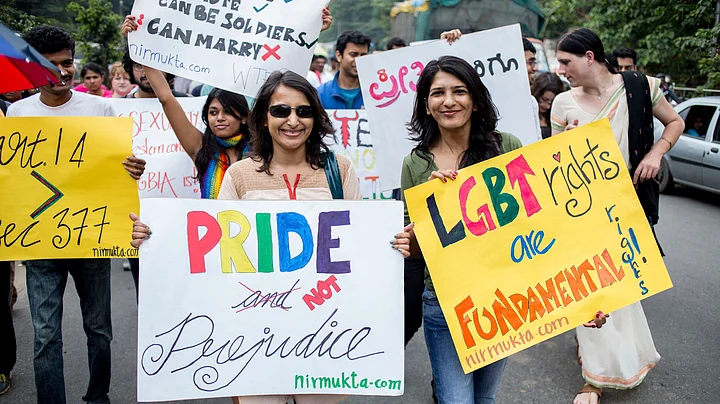Following the US Supreme Court ruling on marriage equality, the world burst into an enthusiastic outpouring of what appeared to be a rainbow. In India, though, the stranglehold of an 1860 colonial-era law, Section 377 of the Indian Penal Code, continues. The fight here is at the initial stage of providing basic dignity and healthcare to members of the LGBTQ community. The BJP can’t seem to make up its mind on what really to do with Section 377. Whether to be youthful and progressive a la #selfiewithdaughter or right winged upholders of India’s ‘culture’, which is possibly why they keep swaying on their stands. Their spokesperson Shaina NC said they’ll decriminalise it while Subramaniam Swamy says homosexuality is a genetic handicap.
Winding Down 377
In 2001 Naz foundation Trust, an NGO and others filed a writ petition challenging the constitutionality of Section 377, following many dismissals and re-petitions, finally in 2009 there came a moment of success when the Delhi High Court declared Section 377 unconstitutional. Sadly, it didn’t last - the decision was overturned by the Supreme Court in 2013. Curative petitions against the SC order were filed in end-March/early-April, 2014. On 22nd April, 2014, the Supreme Court directed that the curative petitions would be heard in an open court. That’s something to rejoice over. A hearing for the case hasn’t come up yet, but the petitioners are hopeful that it will any time soon now.
The Delhi HC decision was challenged by Suresh Kumar Koushal, an astrologer, along with other religious outfits in the Supreme Court. The SC said in its decision that the parliament can look at this matter. The parliament on its part could not discuss the matter because it was sub-judice.
A lockdown.
It’s Officially Not a Disorder, Genetic or Otherwise
The American Psychiatry Association (APA) and World Health Organisation (WHO), have removed homosexuality from their list of disorders in 1973 and 1992, respectively.
Another interesting fact is that while “unnatural sex” is allowed for heterosexuals with the recent revision of rape rules, it continues to be taboo for the queer community. When section 375 of the IPC was amended in 2013, it made penile non-vaginal sexual acts, between man and woman, without consent an offence. By necessary implication, such sexual acts which are consensual are no longer prohibited.
It’s Quite Bharatiya Alright
This video went up last month on YouTube, based on the writings of Devdutt Patnaik. For anyone questioning homosexuality vis a vis that nebulous term “Indian Culture”.
Written submissions of the Naz Foundation (India) Trust in the Supreme Court say:
Prior to the British rule in India, there was no law criminalizing sexual practices per se. Indian society has all along been more tolerant than others, including on the issue of sexuality. Criminalisation is in fact a western import. Ironically, although the English law was reformed in Britain by the Sexual Offences Act of 1967, Section 377 still remains on the statute books in India and is now seen by some as part of Indian values and mores.
The law passed in 2014 recognising transgenders as a third gender is a very progressive move in India. Astonishingly so. One hopes similar sense will prevail and soon we’ll have something of our own to add and celebrate in the world.
(At The Quint, we question everything. Play an active role in shaping our journalism by becoming a member today.)
